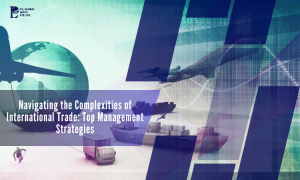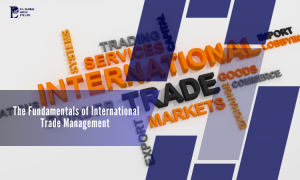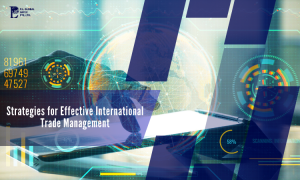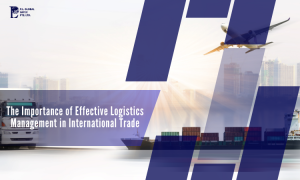Introduction:
In today’s interconnected world, international trade has become a key driver of economic growth and business expansion. However, the success of businesses engaging in global trade relies heavily on effective management strategies. Managing international trade, logistics, and navigating the complexities of the global marketplace require comprehensive planning and execution. In this blog post, we will explore the fundamental strategies essential for thriving in the competitive landscape of international trade.
Navigating the Complexities of International Trade: Top Management Strategies
In today’s interconnected world, international trade has become a crucial component of business growth and success. However, the ever-evolving landscape of global trade presents a complex array of challenges for companies. To effectively manage international trade, businesses must adopt strategic approaches that address these complexities head-on. In this blog section, we will explore top management strategies for navigating the intricacies of international trade.- Building a Strong International Trade Network: Establishing and nurturing relationships with reliable partners, suppliers, and distributors around the world is essential. Collaborating with organizations that specialize in international trade and logistics services, such as Global Trade Limited, can provide valuable support and expertise throughout the trading process.
- Compliance with International Trade Regulations: Understanding and adhering to the intricate web of laws and regulations governing international trade is imperative. Companies must proactively stay updated on changes in import-export policies, tariffs, and trade agreements to ensure smooth operations and avoid potential legal issues.
- Effective Risk Management: International trade involves inherent risks, including fluctuating currencies, political instability, and logistical challenges. Adopting a comprehensive risk management strategy that identifies, assesses, and mitigates potential risks will help safeguard business interests and minimize disruptions.
- Embracing Technology and Automation: Leveraging advanced technologies and automation tools can streamline trade processes, enhance efficiency, and reduce costs. Implementing integrated software solutions for supply chain management, inventory tracking, and customs compliance consolidates information, simplifies tasks, and improves decision-making.

The Fundamentals of International Trade Management
In today’s interconnected world, international trade plays a vital role in the success of businesses across various industries. As companies continue to expand their reach and tap into new markets, managing international trade efficiently becomes a critical skill for leaders looking to thrive on a global scale. Managing international trade involves a comprehensive understanding of the complexities and dynamics of the global trade landscape. From navigating regulatory frameworks to optimizing supply chains, there are several key aspects to consider in order to ensure smooth operations and maximize profitability. One essential component of effective international trade management is the understanding of international trade and logistics. This includes maintaining a fine balance between cost-effectiveness and timely delivery. By partnering with reliable logistics providers and implementing efficient transportation strategies, businesses can streamline their supply chains and eliminate unnecessary bottlenecks. Another vital aspect to consider is the legal and regulatory landscape that governs international trade. Complying with international trade laws and regulations can be daunting, but it is essential for avoiding costly penalties and maintaining a positive reputation in the global market. Staying up to date with the evolving trade regulations and partnering with experienced legal professionals can help businesses navigate these complexities effectively. Global Trade Limited is a prominent player in the field of international trade and offers comprehensive solutions tailored to meet the unique needs of businesses engaged in global trade. Their expertise in managing international trade, coupled with their extensive network of partners and affiliates, enables businesses to expand their global presence and seize new opportunities across borders.
Strategies for Effective International Trade Management
1. Prioritize Market Research:
One of the key aspects of managing international trade successfully is conducting thorough market research. Understand the cultural nuances, preferences, and regulations of your target markets. This will enable your business to tailor its products or services accordingly, ensuring better reception and success.2. Optimize International Trade and Logistics:
Efficient logistics are essential for smooth international trade operations. Collaborate with reliable logistics partners to streamline your supply chain, minimize delays, and increase customer satisfaction. A well-optimized logistics network will also help you manage costs effectively, leading to enhanced profitability.3. Leverage Technology:
Technology plays a pivotal role in managing global trade effectively. Utilize advanced software solutions to automate and digitize various trade processes, such as documentation, customs clearance, and inventory management. This will not only save time but also reduce human errors, enhance traceability, and improve overall efficiency.4. Partner with Global Trade Experts:
Consider collaborating with global trade experts such as Global Trade Limited, who possess extensive knowledge and experience in international trade. Their expertise can provide valuable guidance and support in areas like risk assessment, compliance with trade regulations, and mitigation strategies.

